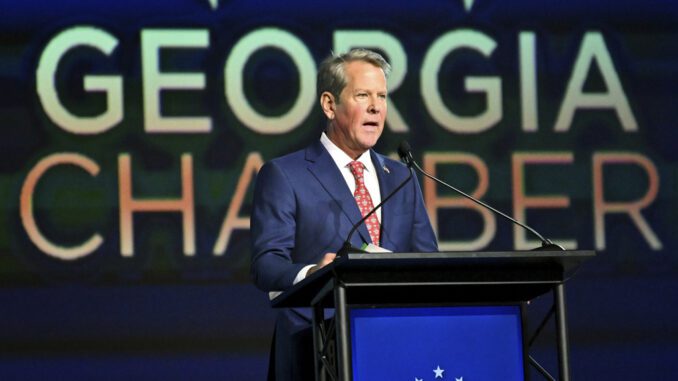
ATLANTA — Georgia’s governor is again suspending state taxes on gasoline and diesel fuel, declaring a legal emergency over higher prices.
Gov. Brian Kemp signed the executive order Tuesday morning. The suspension of the taxes, at 31.2 cents per gallon of gasoline and 35 cents per gallon of diesel fuel, begins Wednesday and lasts through Oct. 12.
Georgia’s government gave up an estimated $1.7 billion in revenue during an earlier suspension over 10 months from March 2022 to January 2023, about $170 million a month.
Georgia can easily afford to forgo the cash, which is used mostly for roadbuilding. Not only is its rainy day account full, but it has roughly $10 billion in additional surplus cash in state accounts. The state is also likely to run another multibillion dollar surplus in the budget year that began July 1, unless revenues fall sharply.
The move also lets Kemp shift the state’s political conversation, which has been consumed by a Fulton County grand jury’s indictment of former President Donald Trump and 18 others for attempting to overturn Georgia’s 2020 presidential election results. Kemp has refused attempts to retaliate against the prosecutor in that case despite an outcry from the most pro-Trump elements of the Republican Party, underlining the divide between Kemp and those forces.
The gas tax rebate lets Kemp instead pivot to talking about his tax cut efforts. He says they are an attempt to help Georgia residents fight inflation, even though most economists say putting more money into consumers’ pockets actually feeds higher prices. Overall, inflation has been easing in the United States in recent months. Inflation data in August showed that overall consumer prices rose 3.2% from a year earlier. That was up from a 3% annual rise in June, but far below last year’s peak of 9.1%.
Kemp successfully campaigned on cuts to gas, income and property taxes in his 2022 reelection victory, contrasting himself with Democratic president Joe Biden.
“From runaway federal spending to policies that hamstring domestic energy production, all Bidenomics has done is take more money out of the pockets of the middle class,” Kemp said in a Tuesday statement that accompanied the executive order declaring a state of emergency. “While high prices continue to hit family budgets, hardworking Georgians deserve real relief.”
Kemp told state agencies they could propose more spending using Georgia’s surplus funds, but Tuesday’s action shows further tax cuts may be Kemp’s favored way to soak up the extra cash. It also shows the continuing political power of gas prices, even as Kemp plows effort and state incentives into recruiting electric vehicle makers to Georgia.
Under state law, Kemp has the power to keep suspending taxes as long as state lawmakers ratify the action when they next meet. The earlier suspension was originally passed by lawmakers, with Kemp extending it seven times as he campaigned against Democrat Stacey Abrams.
State House Speaker Jon Burns signaled his support for the move on Tuesday, meaning Kemp is likely to have the legislative support he needs to affirm the tax break. Lawmakers are next scheduled to convene in January.
“I applaud Governor Kemp’s suspension of motor fuel taxes to keep our people and our economy moving despite Washington’s inaction on rising fuel prices,” said Burns, a Republican from Newington.
The order suspends taxes on wholesalers, and is likely to take a few days to trickle through to retailers who sell fuel to drivers.
On Tuesday, Georgia drivers were paying an average $3.57 per gallon of unleaded gasoline, according to motorist group AAA. That was the 11th lowest among the states, and below the national average of $3.84. The average diesel price in Georgia was $4.35 a gallon.
Gasoline prices in Georgia are higher than the $3.24 drivers were paying a year ago. Prices peaked at $4.50 a gallon in June 2022.
Pump prices also include a federal tax of 18.4 cents per gallon on gasoline and 24.4 cents per gallon on diesel.
Nationally, AAA said last week that gasoline prices were falling despite Saudi Arabia and Russia extending oil production cuts through the end of the year in a move that pushed up prices.



